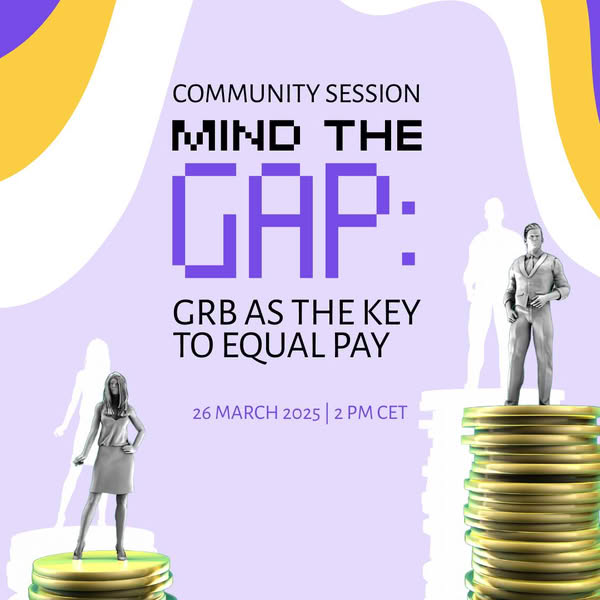GBWN Community session titled MIND THE GAP: GRB as the Key to Equal Pay took place on 26th of February 2025 from 2-4pm CET.
Speakers on this session were:
- Natalia Melnic, Founder and editor-in-chief of the business edition of Glossa, Moldova
- Tania Ivanova, President of Reactor, Macedonia
- Marina Vujacic, Director of the Association of Disabled Youth, Montenegro
- Esmeralda Hoxha, Project Coordinator at Gender Alliance for Development Centre, Albania
- Liz Hind, Local Partnerships and Training Officer at the Women’s Budget Group, UK
The CSOs that were presented during the community session were the following:
Women’s Budget Group, a UK-based think tank focused on exploring the economy through a gendered lens and the leading feminist organisation dedicated to economy. WBG gathers feminist economists, researchers, and advocates working to ensure that economic and budgetary policies advance gender equality. Among other things, their work focuses on analyzing the effects public spending, taxation, and economic policies have on women, emphasizing the role of gender-responsive budgeting in closing the gender pay gap and achieving economic justice.
Association of Youth with Disabilities of Montenegro, an organization advocating for the rights, inclusion, and economic empowerment of persons with disabilities, with a strong focus on economic justice. Within their organization, the AYDM implements a program for Employment. They work to eliminate the multiple layers of discrimination women with disabilities face in the labor market, ensuring that equal pay and fair employment opportunities are a reality for all. The discussion will focus on the differences in wages and subsidies by gender of people with disabilities in Montenegro.
Glossa.md is a Moldovan news organization that specializes in simplifying complex topics related to business, economics, finance and social issues, making them understandable for a wide audience. They present news with the aim of elucidating important topics in a clear and attractive way. Their content is disseminated on various social media platforms, including Instagram and Facebook, to attract a diverse audience. In addition to its informative content, Glossa.md actively monitors the gender pay gap, highlighting gender pay disparities.
REACTOR – Research in Action is an independent and not-for-profit research organisation (think-tank) based in Skopje, North Macedonia. The main focus areas of the organization are Gender Equality, Youth and Urban Development. REACTOR primary focuses and core activity is conducting research and contributes to the processes of policymaking at local, central and regional level through research, advocacy, and furthering debates and discussions on issues that are relevant to Macedonian citizens. During the webinar we will hear from one of the co-authors of the publication: “Bridging the gender pay gap in the Western Balkans? A country case study of Croatia, North Macedonia, Serbia and Slovenia”
Gender Alliance for Development Centre (GADC) is a non-partisan non-profit organization with over 20 years of experience in research, public education, capacity development assistance, monitoring, and advocacy. GADC promotes democratic development and good governance with special focus on gender equity and social inclusion. GADC is a leading CSO in Albania and in South East Europe recognized for its role in introducing crucial issues regarding women’s rights and social inclusion. At the webinar we will hear about the gender pay gap in Albania, based on recent national statistics and looking back at the structural issues that still affect women’s economic empowerment.
The key messages from the webinar include:
- Companies do not make transparent pay rates in Albania cause lack of pay transparency. Gender Pay Gap occurs due to labour violations like lack of unpaid overtime work.
- The pay gap in Europe is around 30 % in Moldova is 15,6% higher than European average. Women must work 39 extra days to earn same as men.
- Equal pay is constitutional guarantee in N. Macedonia. Directives that require pay transparency and are not transposed in the national laws.
- Educational Gender Pay Gap is higher for women with primary and secondary education but it also prevails in higher education in N. Macedonia.
- There is lack of information about employment of women with disabilities in Montenegro. Additionally, there is no available data on cost of living resulting from disability as prescribed by the Convention.
- In Montenegro 60.61% of women with disabilities are registered as unemployed out of the total number of people with disabilities in 2024.
- Declining pay gap in UK in some areas is due not due to the fact that women are doing better, but men are doing worse.
We invite you to watch the recording of the webinar:


